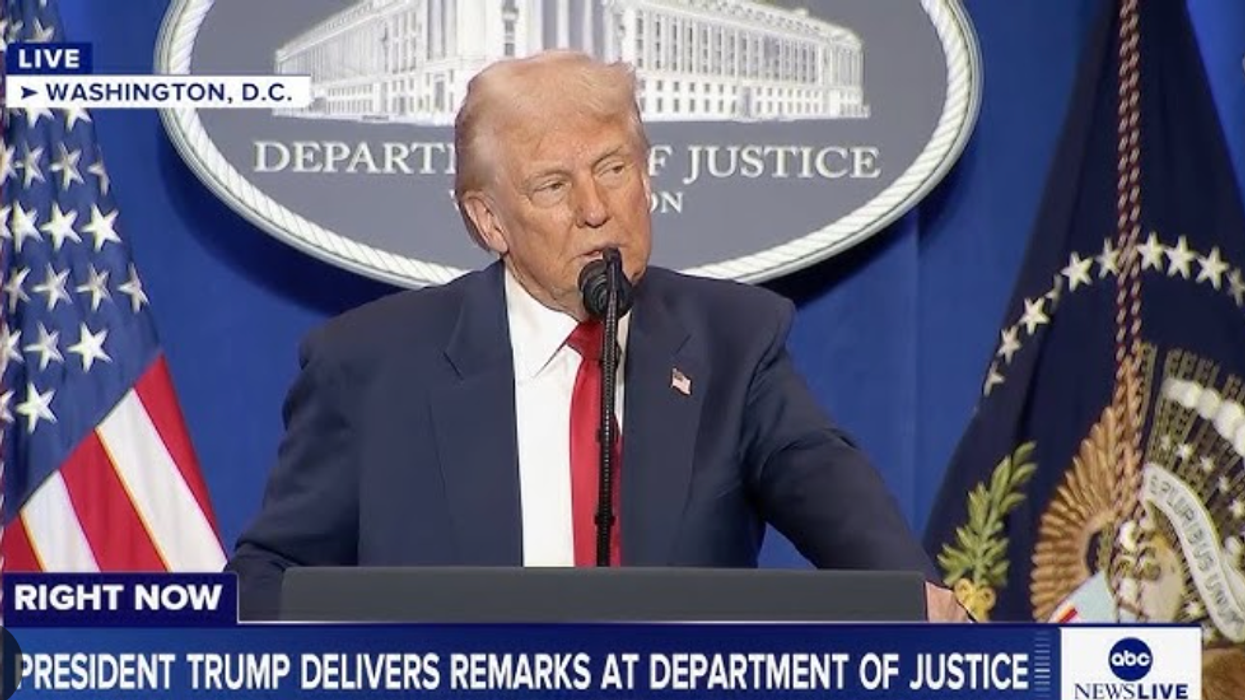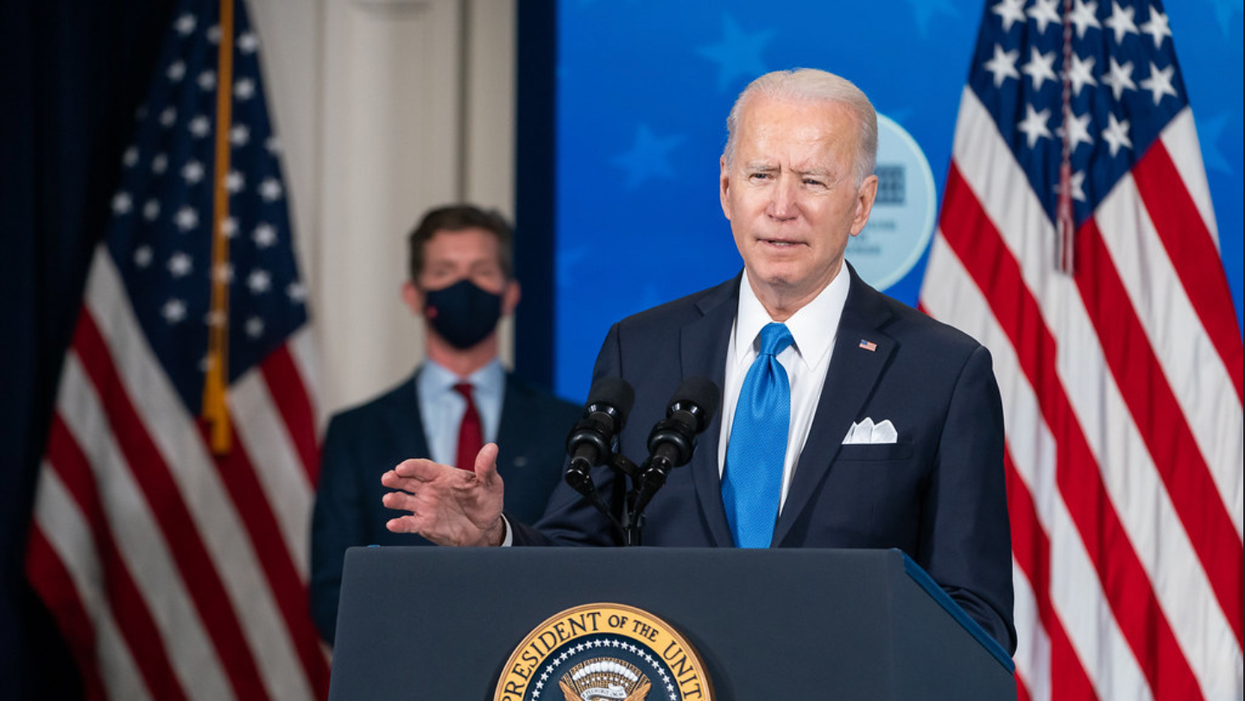Trump's Ban On 'Enemy' Law Firms Advances A More Efficient Fascism
Donald Trump is in the process of issuing a series of executive orders targeting law firms he doesn’t like. The orders strip partners and employees of the firms of their top-secret security clearances, bar the firms from doing business with the federal government, ban employees of the firms from federal office buildings, ban federal contractors from doing business with the firms, and initiate federal investigations of the firms for hiring and promoting people on the basis of race, gender, or sexual orientation.
Trump’s first order was against Covington & Burling, a firm that had done legal work for Jack Smith, the Special Counsel assigned to investigate Trump for his theft of top-secret national security documents and attempting to overturn the results of the 2020 election. He then went after the Perkins Coie law firm, which the New York Times identifies as being “aligned with Democrats.”
Trump then turned his attention to Paul Weiss Rifkind Wharton & Garrison, signing an executive order with the same restrictions on the firm, saying that one of the lawyers for the firm had worked as a prosecutor in New York on the indictment of Trump in the Stormy Daniels hush money case, and that another lawyer had been involved in a lawsuit against January 6 insurrectionists. The order against Paul Weiss similarly forbade the firm from doing business with the federal government, barred any of its clients from federal contracts, and stripped the firm’s access to federal facilities.
The most egregious paragraph in the executive orders against the law firms was the one entitled “Personnel:”
“The heads of all agencies shall, to the extent permitted by law, provide guidance limiting official access from [sic] Federal Government buildings to employees of Perkins Coie when such access would threaten the national security of or otherwise be inconsistent with the interests of the United States. In addition, the heads of all agencies shall provide guidance limiting Government employees acting in their official capacity from engaging with Perkins Coie employees to ensure consistency with the national security and other interests of the United States.”
In essence, what this paragraph does is accuse the law firms’ leadership and employees of disloyalty to the United States, because everything they're being banned from belongs to the United States government. That's where the words “national security” come from. The nation's security is defended by the government. The implication is that if any of the law firms’ employees come in contact with government buildings or personnel, that contact would be a threat to national security, so it must be forbidden.
No evidence is cited for this outrageous allegation. There is nothing in the rest of the language of the executive orders to support why any of the law firms or their employees would be such a threat. Lacking that evidence, the only conclusion that can be drawn is that the disloyalty of the law firms and their employees is to Donald Trump, not to the nation. This is just rank unsupported prejudice.
Perkins Coie did not take the ban lying down, immediately suing in federal court on the basis that the executive order was unconstitutional. Judge Beryl Howell issued a temporary restraining order forbidding the enforcement of the executive order. The Trump DOJ then moved in the D.C. Court of Appeals to get the judge disqualified. This was after the Trump administration had filed another appeal trying to disqualify Judge James Boasberg from hearing the case involving the deportation of more than 100 Venezuelan migrants on the basis that they belong to a drug gang.
So not only is Trump banning entire law firms from going into court against the administration, he is attempting to convince the D.C. Court of Appeals to get two well regarded federal judges with long experience banned from hearing cases against Trump and his administration.
What Trump has done is to make it impossible for these law firms to do business with the federal government, to file lawsuits against the federal government, or take clients who had business with the federal government. They must be able to do research, interview witnesses, and gather evidence if they're going to sue the federal government or defend anyone against charges brought by the Department of Justice. So, if you represent, say, Lockheed Martin, you wouldn't have any access to the Pentagon where the company's contracts for the F-35 fighter were written. If you represent a contractor who worked on a naval vessel like an aircraft carrier or a submarine, you wouldn't be able to enter a naval base where those ships are located, or interview anyone involved in the building or contracting for naval vessels.
This is the meat and potatoes of what lawyers do. Take away the right of employees from these law firms to walk into federal buildings, access federal documents, and review documents or interview anyone on any subject involving secrets and national security, and you're taking away the lifeblood of their business.
The Paul Weiss firm quickly made a deal with Trump promising to do $40 million worth of pro bono work for the White House. The White House issued a statement saying that the firm had “acknowledged the wrongdoing of its former partner Mark Pomerantz,” and had committed to ending its program of diversity, equity, and inclusion in hiring and promotion.
In other words, the Paul Weiss law firm caved into Trump's demands so that security clearances held by its employees could be retained and the business the firm and its clients do with the federal government would not be damaged.
What Trump is doing with his assault on major law firms by executive order smacks of what Adolf Hitler did in the 1930s when he brought the entire legal profession and judicial system of Germany to heel by barring Jewish lawyers and judges from the German courts and forbidding Jewish lawyers from doing business with the German government.
This is from an article published by the Federal Bar Association titled “Lawyers and Bar Associations Play a Vital Role in Preserving the Rule of Law: A Study of How Hitler Perverted Germany’s Judicial System Highlights the Importance of Lawyers.”
“Hitler’s early decree stripping Jewish lawyers and judges of their professional capacities marked an early step in the decline from liberty to dictatorship. According to research conducted by the German Federal Bar and documented in its exhibit, “Lawyers without Rights: Jewish Lawyers under the Third Reich,” Hitler’s 1933 decree barring Jewish lawyers and judges from German courts did not trigger any formal protests or objections from non-Jewish lawyers or judges. There were many respected bar associations in Germany, but they did not oppose this action.”
The only difference here is that Trump is not starting with a religious minority, but with a minority of law firms and a minority of judges handling cases against the Trump administration. He knows that if he can knock down one or two big time law firms and manage to bar several of the judges hearing lawsuits against his administration from hearing the cases before them, he will have the entire legal profession and judiciary intimidated into falling in line.
This is the way fascism starts, with the few not the many, but the many are next. Today it's law firms barred from government buildings and judges barred from hearing lawsuits. Tomorrow it could be individual citizens barred from appealing decisions about their taxes or Social Security because Trump doesn't like the political party they belong to or the demonstration they attended or the club they joined in college. Today it's alleged drug dealers rounded up without charges and banned from the country.
Tomorrow it could be you and me.
Lucian K. Truscott IV, a graduate of West Point, has had a 50-year career as a journalist, novelist, and screenwriter. He has covered Watergate, the Stonewall riots, and wars in Lebanon, Iraq, and Afghanistan. He is also the author of five bestselling novels. He writes every day at luciantruscott.substack.com and you can follow him on Bluesky @lktiv.bsky.social and on Facebook at Lucian K. Truscott IV. Please consider subscribing to his Substack.
Reprinted with permission from Lucian Truscott Newsletter












